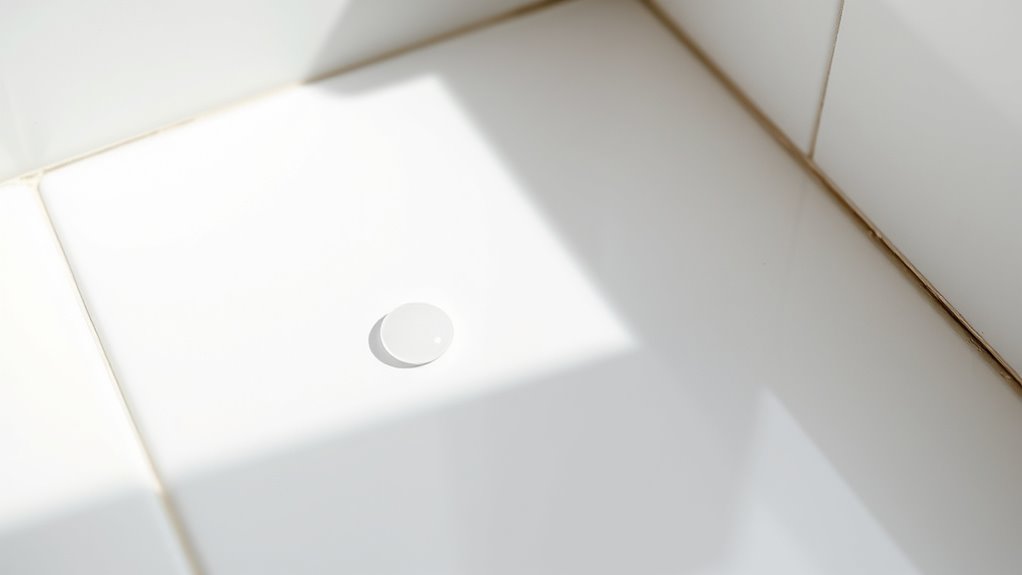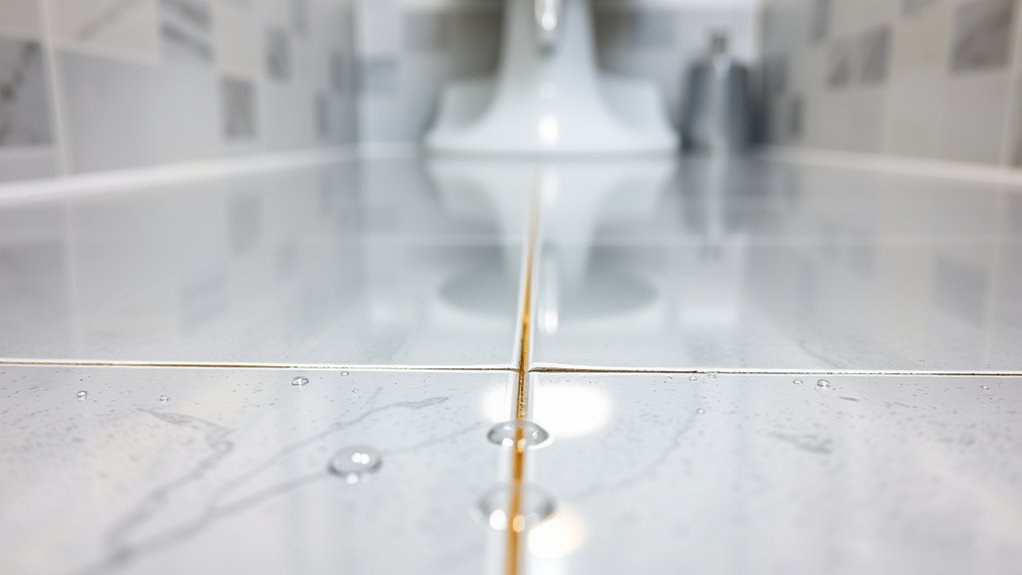Antimicrobial grout really works by actively inhibiting bacteria, mold, and mildew growth on tiled surfaces, making your spaces cleaner and healthier. Its specially formulated properties guarantee ongoing protection that fights germs over time. Proper cleaning, sealing, and maintenance help maximize its effectiveness and durability. If you want to learn how to get the most out of antimicrobial grout and keep your environment safer, there’s more you should know.
Key Takeaways
- Antimicrobial grout actively inhibits bacteria, mold, and mildew growth on tiled surfaces, promoting a healthier environment.
- Proper cleaning, including gentle routines and sealing, is essential to maintain its antimicrobial effectiveness.
- High-quality antimicrobial grout resists stains and wear, ensuring long-term microbial protection.
- Overly abrasive cleaning or harsh chemicals can damage grout, reducing its antimicrobial properties.
- Regular maintenance and correct installation maximize the grout’s antibacterial benefits and durability.

Antimicrobial grout is a specialized sealing material designed to inhibit the growth of bacteria, mold, and mildew in tiled surfaces. When you choose antimicrobial grout, you’re investing in a product that actively fights germs, helping to keep your space cleaner and healthier. But to truly benefit from its properties, you need to understand how proper cleaning protocols and material resilience work together. Regular cleaning is essential, even with antimicrobial grout; it prevents dirt buildup that can hide bacteria or compromise the seal. Using gentle, non-abrasive cleaners ensures you don’t damage the grout’s surface, maintaining its antimicrobial properties over time. You should focus on consistent routines—wiping down tiles and grout lines after use, especially in high-moisture areas like bathrooms and kitchens. This proactive approach prevents the formation of mold or mildew before they take hold.
Material resilience plays a vital role in your grout’s long-term effectiveness. High-quality antimicrobial grout is designed not only to resist bacteria but also to withstand daily wear and tear. It’s formulated with special additives that promote resilience against moisture, stains, and cleaning chemicals. When installed correctly, these materials form a strong, lasting barrier that retains antimicrobial properties longer. Keep in mind that improper installation or neglecting maintenance can reduce the grout’s durability and its ability to fight microbes. Over time, grout can crack or degrade if subjected to harsh cleaning agents or excessive moisture, creating entry points for bacteria. That’s why choosing a durable product and following manufacturer guidelines for cleaning and sealing is essential.
In addition, understanding how different cleaning protocols impact material resilience helps you preserve your investment. For example, using overly abrasive scrubbers or harsh chemicals can erode the grout’s surface, diminishing its antimicrobial effectiveness. Instead, opt for soft brushes and pH-neutral cleaners, which clean effectively without damaging the grout. Sealing the grout periodically also boosts its resistance to moisture and microbial growth, extending its lifespan. Proper support and maintenance are crucial to ensure your antimicrobial grout continues to perform effectively over time. When you integrate these practices—regular, gentle cleaning and choosing durable, high-quality materials—you maximize the benefits of antimicrobial grout. You create a safer, more hygienic environment that stays cleaner longer, with less effort needed to maintain it. Ultimately, antimicrobial grout can be an effective solution, but only if you understand and implement proper cleaning protocols and respect the importance of material resilience.
Frequently Asked Questions
How Long Does Antimicrobial Grout Maintain Its Effectiveness?
You wonder how long antimicrobial grout stays effective. Its durability lifespan depends on factors like installation quality and usage, but typically, it remains active for several years. Regular maintenance frequency, such as cleaning and resealing, helps prolong its effectiveness. Proper care ensures the antimicrobial properties continue to prevent mold and bacteria growth, so you get the most out of your investment. Expect a good lifespan with consistent upkeep.
Is Antimicrobial Grout Safe for Children and Pets?
Imagine you’re renovating your bathroom and wonder if antimicrobial grout is safe for your children and pets. Generally, it’s designed to be non-toxic once cured, making it safe for child safety and pet health. For example, a family with young kids used antimicrobial grout in their kitchen, and no adverse reactions occurred. Still, always follow manufacturer instructions and confirm proper curing to keep your loved ones safe.
Can Antimicrobial Grout Be Used Outdoors?
You can use antimicrobial grout outdoors, but you need to take into account outdoor durability and UV resistance. While some antimicrobial grouts are formulated for exterior use, not all are designed to withstand weather conditions, sunlight, and moisture. Check the product specifications to ensure it offers UV resistance and durability against outdoor elements. Proper application and sealing can also extend its lifespan, making it a practical choice for outdoor projects.
Does Antimicrobial Grout Require Special Cleaning Products?
Think of antimicrobial grout as a loyal guard for your tiles. It doesn’t need special cleaning products but benefits from regular cleaning to maintain its defenses. You can use gentle, everyday cleaners to preserve its chemical resistance and keep it effective. Cleaning frequency depends on your space—more traffic means more frequent upkeep. Stick with mild solutions, and your grout will stand strong, resisting germs and stains just like a steadfast protector.
How Does Antimicrobial Grout Compare in Price to Regular Grout?
When comparing the cost of antimicrobial grout to regular grout, you’ll notice antimicrobial options typically cost more upfront. The price difference reflects the added benefits of preventing mold and bacteria growth. If you’re considering budget considerations, weigh the initial investment against long-term savings on cleaning and maintenance. The cost comparison shows antimicrobial grout may be pricier initially, but it could save you money over time by reducing the need for frequent cleaning and replacements.
Conclusion
So, does antimicrobial grout truly revolutionize your cleaning routine? While it’s a promising solution to keep germs at bay, don’t rely on it as your sole defense—germs are resilient, and it’s no magic wand. Think of it as a powerful weapon in your cleaning arsenal, but not invincible armor. If you want a truly germ-free space, combine it with regular cleaning habits. After all, even the strongest armor needs reinforcement!










